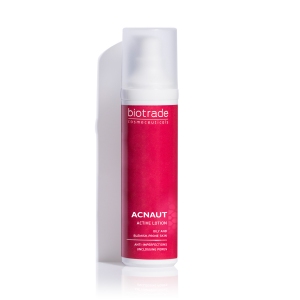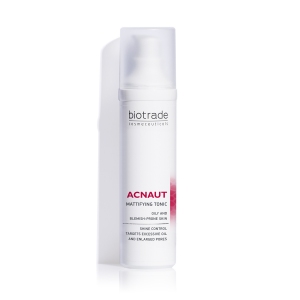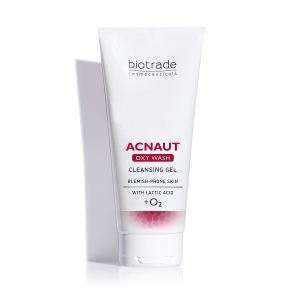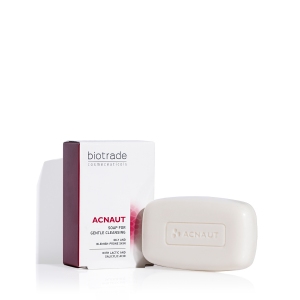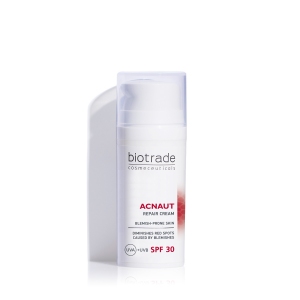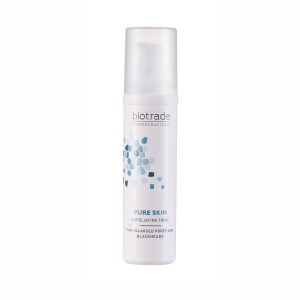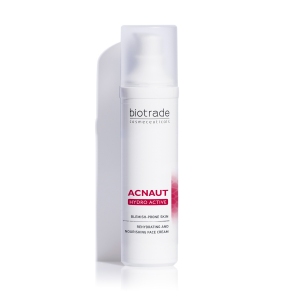
Find the connection between the microbiome, vitamin D and acne?
Oily Skin
In the last 4-5 years researchers from the scientific world have been talking very seriously about their discoveries in the field of the human microbiome or microbiota. It is a collective term of all microorganisms that live as saprophytes (nonpathogenic companions) in symbiosis with the human organism.
What is the microbiome?
The microbiome on our skin is the aggregation of more than 1 000 types of bacteria and microorganisms that live in complete symbiosis with us. It is an invisible mantle with weight of around 1,4kg and it is so specific for every individual that it can be compared to the fingerprints. The balance and the ratio of the different types of bacteria in the microbiome determine the protection of the skin from the factors of the outer and inner environments. Adjusting the ratio between them is vital for the pathogenic performance of some bacterial strains. Disturbing the balance of the microbiome leads to certain dermatological diseases and that is why scientists actively research and look for ways to influence this balance.
Microbiome and acne?
Acne is one of the most widespread skin diseases and it affects an immense part of the world population. It is a truly global disease which affects all races and sexes. More than 80% of the people have suffered from acne at some point in their life. Therefore, scientists begin to study the connection between acne and the microbiome, trying to understand why only one in every five people does not suffer from acne and which are the factors that can balance the microbiome to its healthy norm.
Although acne is such a common disease, not all of its vitamicauses are completely clear. Nevertheless, one thing is clear to all – the root of the disease is bacteria Propionibacterium acnes.
The DNA analysis of the skin microbiome shows that Propionibacterium acnes is a dominant species on the skin of a patient with acne. It is anaerobic and when its population expands, it impedes the function of the normal aerobic bacteria on the skin, e.g. the Staphylococcus epidermidis, substantially changing the environment and the balance of the microbiome.
The balance in the ratio between the various microorganisms in the microbiome is of extreme importance for the pathogenic performance of some bacterial strains. Propionibacterium acnes is also found among healthy patients but its levels are significantly lower which makes it a nonpathogenic saprophyte.
However, how to balance the microbiome so that the population of the good strains with protective functions grows and the ones with pathogenic effect decrease?
What is the role of the antimicrobial peptides?
The newly discovered antibacterial peptides – cathelicidins and defensins – have substantial role in regulating the microbiome balance as they are the natural protection of the skin and the balance of the microbiome.
They are protein particles, synthesized in the skin cells – in the keratinocytes and sebocytes – and are part of our weapon against the microbes that surround us. Thanks to these peptides we are able to protect ourselves from the various pathogens of the environment, preventing us from suffering from constant skin infections. For example, the cathelicidins possess not only antimicrobial characteristics, but also antifungal, antiviral, immunostimulatory and modulating characteristics. What is more, they can induce the healing of wounds and to modulate the apoptosis (the programmed cell death) of already damaged cells.
The production of cathelicidins by the fat cells (sebocytes) is directly connected with the normal levels of vitamin D in the organism. If there is vitamin D deficiency, the synthesis of antimicrobial peptides decreases and this affects the balance of the skin microbiome.
Vitamin D – what is it?
Vitamin D is a fat-soluble vitamin that is rare in nature but is synthesized in the human organism when exposed to sunlight. Most vertebrates need vitamin D to develop and maintain a strong and well mineralized bone system. Besides regulating the calcium deposition and the bone metabolism, vitamin D has a proven effect on the proper functioning of the immune and nervous systems, as well as on the hormonal balance. It is essential for the skin since it regulates the differentiation of keratinocytes and the synthesis of antibacterial peptides.
The important for us forms of vitamin D are D2 (ergocalciferol), which is obtained with the food (oily fish, liver, yolk, mushrooms) and D3 (cholecalciferol), which is produced by the skin when exposed to sunlight.
What is the role of vitamin D?
First of all, vitamin D regulates the calcium and phosphorus metabolism in the body. It boosts the efficiency of the immune system, stimulates the processes of cell differentiation and has a powerful anti-inflammatory effect.
Vitamin D helps in blood sugar level regulation and has a preventive role against the development of diabetes type 1 and type 2.
That is why maintaining optimal levels of vitamin D in the blood protects us from rachitis, osteoporosis, autoimmune diseases such as arthritis, lupus, diabetes and, as shown above, it protects us from acne. But is it so easy to provide ourselves with vitamin D in a natural way?
Research shows that the modern urbanized way of living leads to an increasing percentage of people with vitamin D deficiency. Studies of the Bulgarian Osteoporosis Association indicate that 79% of women in Bulgaria have such deficiency while on an international scale this is valid for between 50% and 70% of Europeans. In other words, our lifestyle does not provide us with the sufficient amounts of vitamin D, among many others, and this worsens the resistance and the protection of the organism against the impacts of the environment.
Acne and vitamin D
Let us go back to where we started and try to summarize what we have learned so far about the microbiome, acne, Propionibacterium acnes and about those special antimicrobial peptides that led us to vitamin D. What connects all of these concepts is the unique human organism which is constructed in such a way that even the invisible microorganisms living on the skin play a vital role in its proper functioning. Research in dermatology reveals more and more interesting connections between the different skin diseases and the disturbed balance of the microbiome. The fragile equilibrium must be maintained on a daily basis.
In conclusion, we emphasize on the fact that vitamin D is essential for sustaining the balance of the microbiome through the synthesis of antimicrobial peptides, which leads to an increase in the skin’s resistance against pathogenic microorganisms such as Propionibacterium acnes.
Acne is a multifactor disease and it requires special care and adequate treatment.
We all know well that the balance depends on various conditions and we are responsible for it with our actions or with the lack of actions. Proper way of life, healthy eating plan and/or additional food supplements and vitamins – all of this, although banal, provides you and your skin with the health you need.

